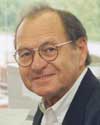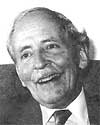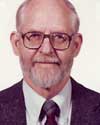Robert Zajonc
Social psychologist Robert Zajonc, who conducted groundbreaking research on the complexities of social life, died after a five-year battle with pancreatic cancer Dec. 3 in Palo Alto, Calif. He was 85.

Born in Lodz, Poland, Zajonc’s parents were killed during World War II in a German air raid when he was 15 and he spent several of the war years in Nazi work camps until he escaped by walking 900 kilometers to Quimper, France. He came to the United States after the war, receiving his bachelor’s, master’s and doctoral degrees from U-M.
During his tenure at the University, he served as director of the Institute for Social Research (ISR) and of the ISR Research Center for Group Dynamics. After he retired in 1994, he joined the Stanford University faculty as an emeritus professor.
It was at U-M that Zajonc conducted a series of well-known studies that made him one of the most widely cited and influential social psychologists in the world. The scope of his work ranged from the impact of familiarity on attitudes to the emergence of individual preferences and the influence of family dynamics on intellectual performance.
“Robert Zajonc was one of the most distinguished social psychologists in history,” says psychologist Richard Nisbett, a long-time colleague. “The range of his interests and accomplishments is virtually without parallel. His work was central to many different fields of psychology. His students include some of the most highly regarded social psychologists in the world. His piercing intelligence was matched by his generosity of spirit.”
One of his early lines of research established how the presence of others influenced performance for better and for worse, in creatures from cockroaches to college sophomores. Zajonc showed that people performed tasks they knew faster and better when they were with other people, and that they made more mistakes at new tasks than they did when alone.
He also conducted a series of studies that belie the common belief that familiarity breeds contempt. He showed that mere exposure to a stimulus, in and of itself, led people to rate that stimulus more positively. He demonstrated that this was the case using stimuli as diverse as faces, Turkish words and Chinese ideograms.
Zajonc also conducted a series of studies on social behavior that explored the relationship between feeling and thinking. He maintained that preferences need no inferences, that feelings precede cognition, and that affect and cognition operate independently of each other.
But it was his work on the link between birth order, family size and intelligence, conducted with U-M psychologist Gregory Markus that attracted the most popular attention. In the mid-1970s Zajonc and Markus conducted research showing that as family size increases, the overall IQ of the family drops. First-born children, born into adult-only families, tend to have higher IQs than younger siblings, the research showed, while the youngest child in the family tends to have the lowest IQ.
During his long career, Zajonc received many honors and awards. In 1989 he received the Distinguished Scientific Contribution Award from the American Psychological Association. He was a member of the American Academy of Arts and Sciences, and earned Guggenheim, Fulbright and Rockefeller fellowships. He held honorary degrees from the University of Louvain and the University of Warsaw, where he established a partner institution with ISR to advance research, scholarship and teaching designed to improve understanding of societies in transition.
Zajonc is survived by his wife Hazel Markus of Palo Alto, and their daughter Krysia Zajonc of Costa Rica; sons Peter of New York, Michael of Belgium and Joseph of Seattle, and their mother Donna Zajonc of Ann Arbor; and grandchildren Jonathan, Oliver, Zoe and Lucy.
A memorial service was held Dec. 6 at Stanford; another memorial is planned for Jan. 12 in Ann Arbor. For more information, contact Mary Guttman at [email protected].
The family requests that memorial contributions be made to the Robert Zajonc Scholars Fund at ISR.
Dr. David Bohr
Dr. David Bohr, a long-time professor of physiology, died Nov. 4. He was 93 years old and lived most of his adult life in Ann Arbor.

Bohr was born in Zurich, Switzerland, lived for five years in Cuba, and received most of his childhood education in southern California. In 1933 he entered U-M, matriculated in 1936 in its medical school and graduated in 1942. Bohr interned at Henry Ford Hospital before being assigned by the U.S. Army to a Dutch hospital ship where he served from 1943-46 as a laboratory officer and detachment commander. Following his wartime service, he trained from 1946-48 as a research fellow at University of California, San Francisco. He returned to the Department of Physiology in 1948 and was promoted to professor in 1957.
He was known internationally for his work on the role played by the vasculature in the development of hypertension. Based on his many publications, he received numerous awards, including the 1984 Ciba Award for Hypertension Research and the Gold Heart Award from the American Heart Association. In 2007 Bohr received the Lifetime Achievement Award from U-M.
Bohr was a dedicated educator who mentored numerous scientists and students.
“I first met David Bohr, during the late ’50s, when I was in Ann Arbor on leave-of-absence from the University of Western Ontario,” says John Faulkner, professor of biomedical engineering and physiology. “He was a major factor in my move to the U-M in 1960 and my appointment in physiology in 1965.
“Our families have been the closest of friends for 50 years and David has been a constant source of professional support and counsel. Along with all their relatives and friends, we shall miss David greatly, as we miss his wife Kathleen (Katie) who died earlier this year. Throughout their lives, David and Katie took great pleasure in tennis, and we played tennis with colleagues at various National Meetings of the Physiological Society. As have family, countless friends and David’s students, we have enjoyed their ready sense of humor, compassion and optimism, and their love of life and of learning.”
Throughout his long career, Bohr served many scientific societies including the American Heart Association and the American Physiological Society (APS). He served on the Hypertension Task Force for the National Institutes of Health from 1978-79. From 1965-68 he was a member of the Committee on Physiology of the National Board of Medical Examiners and he served on the Cardiovascular Review Panel for the Space Science Board of the National Academy of Sciences from 1968-72. As president of APS in 1978-79, Bohr visited Cuban medical schools and observed Cuban health care, and promoted exchange of information between Cuban and American physiologists.
The Bohrs were married in 1940. They are survived by their son, John Nicholas Bohr of Ann Arbor; two daughters, Ann Bohr Benner of Charlottesville, Va., and Louise Ann Bohr of Chicago; and grandchildren Thomas Bohr Benner of Brooklyn, N.Y., and Jack Allen Benner of Charlottesville, Va.
A memorial service, titled “David Francis Bohr, M.D., Gentleman Scientist,” will be held noon-4 p.m. Jan. 31 at the Michigan League, League Ballroom in Ann Arbor ( www.umich.edu/~league). In lieu of flowers, contributions should be made to the David F. Bohr Quasi Endowment, Department of Molecular & Integrative Physiology, University of Michigan, 1301 E. Catherine, Ann Arbor, Mich. 48109, or go to www.physiology.med.umich.edu.
— Submitted by John Faulkner and Clinton Webb, Department of Physiology
Leland Quackenbush
Leland Quackenbush, professor emeritus of mechanical engineering and assistant dean emeritus at the College of Engineering (CoE), died Oct. 6 at Glacier Hills Retirement Center after struggling for several years with the debilitating effects of Alzheimer’s disease.

Prior to his illness Quackenbush enjoyed a long and fulfilling life with family, friends and colleagues. He was born in 1920, the second of five children to Ross and Margaret (Smith) Quackenbush in Jackson, Mich., where he graduated second in his high school class from Jackson High School. He completed his Bachelor of Science in Engineering degree in 1942 and Master of Science in Engineering in 1948, both in mechanical engineering at U-M.
In 1942 Quackenbush began his professional career as a design engineer at Vickers Inc., where he worked for 14 years. He renewed his more than 30-year association with the University as an assistant professor of mechanical engineering in 1957. He retired in 1986. His technical expertise in the study of materials and manufacturing processes as well as teaching skills were acknowledged by multiple awards from students, colleagues and the University during his tenure.
Quackenbush also had a deep commitment to administrative service for the Department of Mechanical Engineering and CoE, having served as the department’s program advisor and on numerous academic and planning committees. He was an active industry consultant and expert witness during his career and in retirement. He also belonged to American Society for Engineering Education, Society of Manufacturing Engineers and American Society Of Mechanical Engineers.
In 1942 he married Elizabeth “Betty” Hasse, to whom he was a devoted husband for their 66 years of marriage. Together they raised three children: Ann Ongerth of Seattle, Jamie and Eric of Ann Arbor. Jamie preceded him in death in 2005. He also is survived by four grandchildren, Benjamin of Murfreesboro, Tenn., Christopher of Lilburn, Ga., Amanda Guidotti of Bear, Del., and Blair of Ann Arbor; sister Sue Foltz; several cousins; and numerous nieces and nephews.
A scholarship for students has been set up in his honor at CoE. Checks should be made out to “The University of Michigan College Of Engineering,” and the memo line should read: “Emeritus Professor Leland J. Quackenbush Memorial Gift.” Mail to U-M College of Engineering, Robert H. Lurie Engineering Center, 1221 Beal Avenue, Ann Arbor, MI 48109-2102, Attn: Bobbi Simson.
— Submitted by Eric Quackenbush
Dr. Ronald Hiroyuki Nishiyama
Dr. Ronald Hiroyuki Nishiyama, a former professor of pathology at the Medical School, died Sept. 12. He was 76.
Born in Honolulu, Hawaii, Nishiyama attended the University of Hawaii and Johns Hopkins University. In 1957 Nishiyama graduated from the U-M Medical School. He subsequently completed residency training in anatomic and clinical pathology in the Department of Pathology. He then served in the U.S. Army Medical Corps and following discharge he joined the faculty of the Department of Pathology at the Medical School. While at U-M he received the Elizabeth Crosby Award for Excellence in Teaching in the Basic Sciences.
In 1979 Nishiyama left U-M to become chief of surgical pathology at the Maine Medical Center and professor of pathology and laboratory medicine at the University of Vermont. He retired in 1997 as chief of the Department of Pathology and Laboratory Medicine.
Nishiyama was a prolific writer with numerous publications and medical texts, as well as a frequent guest speaker at the Asian Association of Endocrine Surgeons. He collaborated on a number of international research projects and lectured before medical audiences in more than a dozen countries. In addition he was a member of several professional organizations including the college of American Pathologists, the International Academy of Pathology and the A. James French Society of Pathologists, which was named after the third chair of pathology at U-M.
He is survived by his wife of 52 years, Jean Kishida Nishiyama; two children, Dr. Stephen Nishiyama of Boston and Nancy Nishiyama Terry of Louisville, Ky.; two grandchildren, Gavin and Liam Terry; and brother Robert of Honolulu.
Donations may be sent to the Ronald Hiroyuki Nishiyama, M.D., Surgical Residency Endowment, FundMaine Medical Center, Office of Development, 22 Bramhall St., Portland, Maine 04102.
— Submitted by Dr. Jay Hess, Department of Pathology

